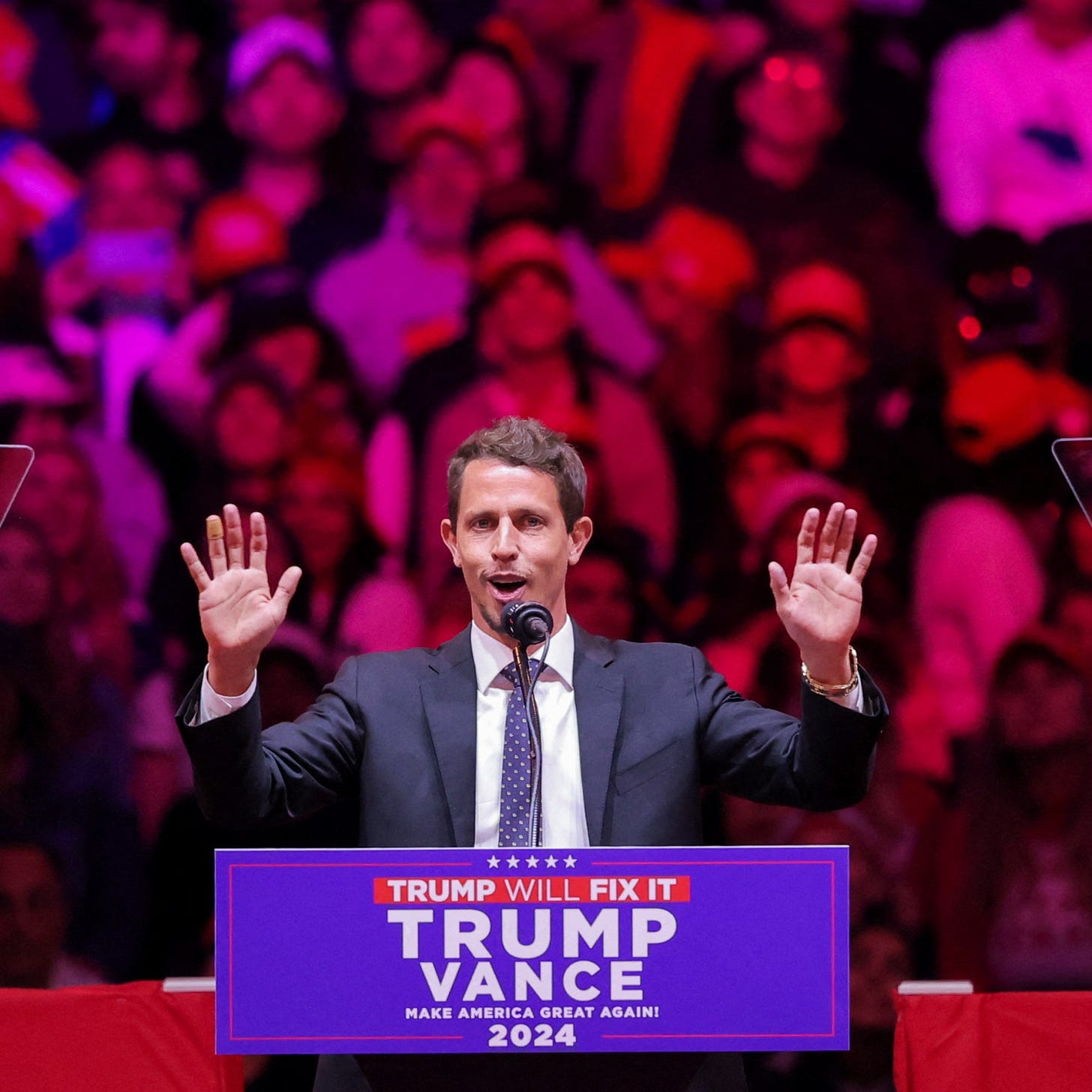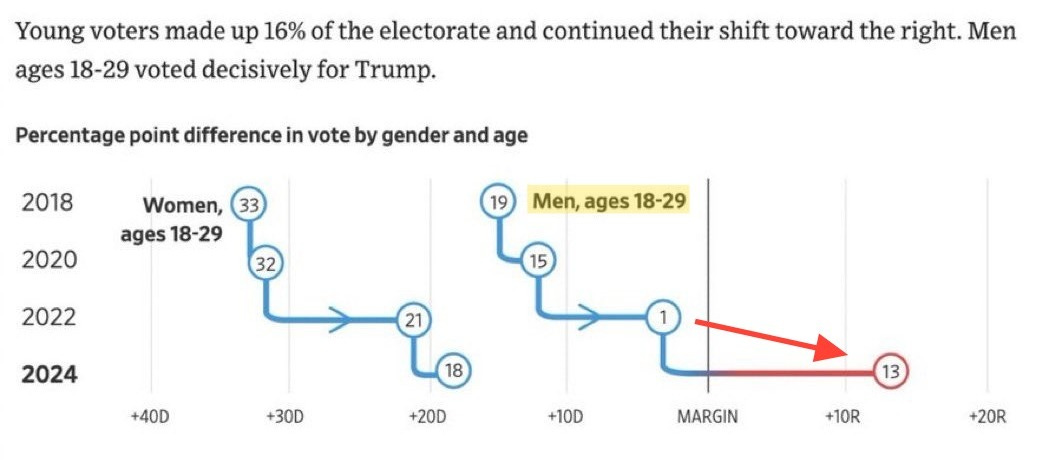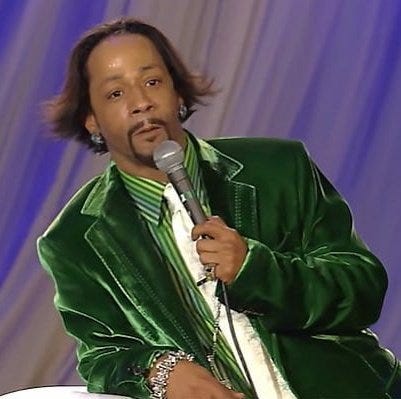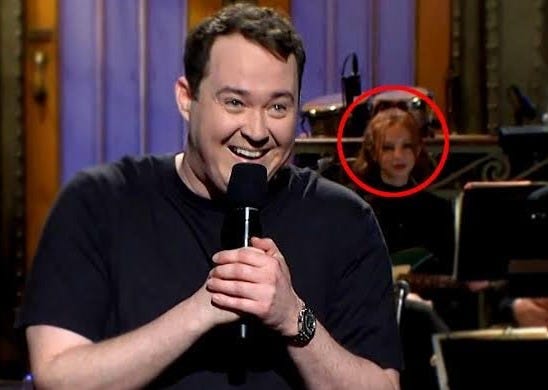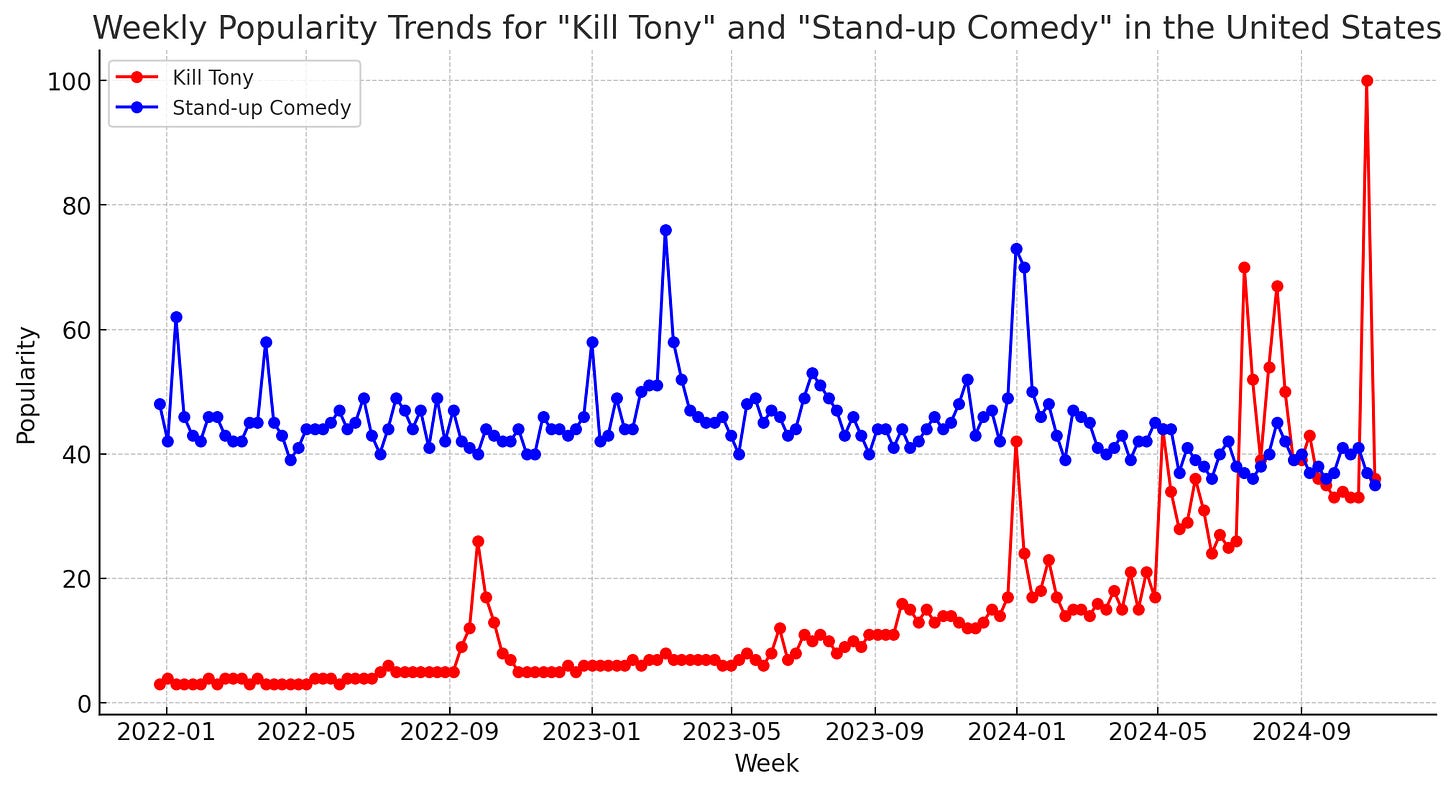"Against the assault of laughter, nothing can stand."
— Mark Twain
The Bro Vote
In regards to the election outcome, consider this: those furthest removed from the cultural undercurrents driven by anti-postmodernism and the rejection of social constructivism were the people most shocked by the result. In contrast, to those genuinely laughing at the off-color jokes (even if only from afar) and rolling their eyes at the outrage, Trump’s victory was—if not expected—unsurprising. America has regained its sense of humor.
True for the right as it is the left, we surround ourselves with like-minded people, at least to some degree. And for good reason: it feels safe to exist in a space where you’re able to say what you think and think what you say. But how do these safe spaces become formed? To oversimplify: worldviews shape preferences, preferences determine behaviors, behaviors tend to survival, survival relies on externalities and voila, humans tribally congregate.
The novelty of the postmodern world, however, isn’t the human tendency to congregate. Rather, it’s the algorithmic rationing of digital codes and synthetic tropes which, by design, reinforce the factional tones echoing throughout our chambers. This election cycle, my chamber had echoes of 2016.
By now, I’ve grown accustomed to the progressive left’s asynchrony with its cultural counterparts. And let’s be clear—it’s not as if anyone, regardless of political leanings, was left unaware of the case for Harris or the arguments against Trump. Pro-Harris, anti-Trump (more the latter than the former) messaging was relentlessly peddled, saturating every platform. From mainstream outlets to group chats, the narrative was unavoidable and deafening—and online, thanks in no small part to the Media Industrial Complex1, it was impossible to tune out, almost as if by design.
As I laid out prior to the election: nearly half of adults under 30 say social media is their main source of political and election news, while 43% of voters under the age of 45 are swing voters, versus only 33% of overall voters. Informed by this paradigm, the Harris campaign’s messaging was spread abundantly, but more in the owned media than the earned media kind of way—which, given the outcome, is to say that their messaging was heard, but it wasn’t heard. In retrospect, neither the pro-Kamala nor the anti-Trump arguments landed—and the Democrats’ lacking awareness of cultural shifts was to blame.
For the unchambered, or perhaps even ambivalent voter, the requisite for reading the tea leaves was merely tuning in to the world's most popular podcast, The Joe Rogan Experience. For those who did tune in or have long-been tuned in—predominantly young males like myself—Trump’s victory came as no shock, much less a letdown. Exit polls suggested that just 4% of surveyed men aged 18-29 felt devastated by the election outcome2:
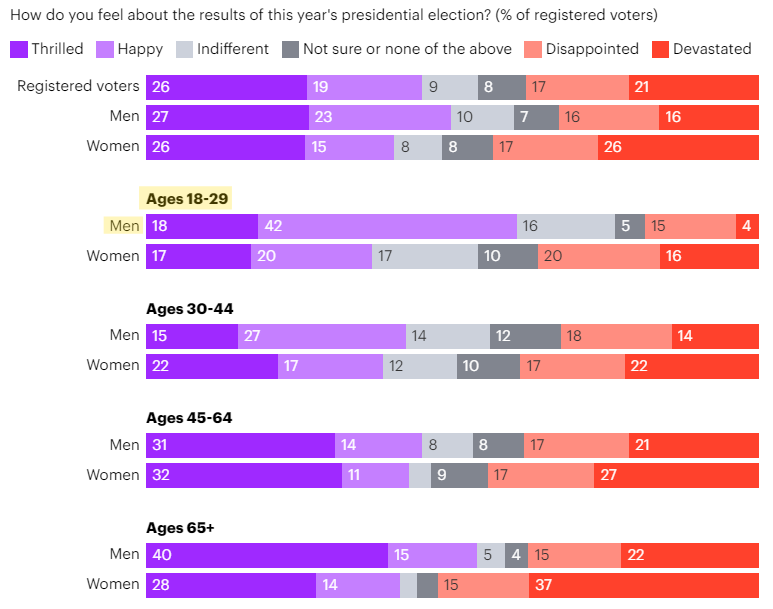
Actual voting data from the 2024 election paint a similar picture: 46% of young people voted for Trump, up from 36% in 2020. Furthermore, this election marked a key shift in the electorate as, for the first time as a whole group (not just white), young men voted for the Republican candidate by a majority.
This young male electorate—the Bro Vote, if you will—has swung drastically to the right and contributed to a decisive outcome in 2024. To those surprised by such a dramatic shift, welcome to a world where dudes just telling jokes on comedy podcasts shape voter perceptions. Allow me to mansplain.
The un-canceling of comedy culture
“I don’t even give a shit ‘bout politics no more ‘cause I done figured it out. All of the government is pimps. They all pimps ‘cause pimps say shit to you and then don’t explain it. That’s how our government do. A pimp’ll have a woman in the car and be like ‘get out there and suck some dick, we gon’ to take over all the Stone Mountain.’ She don’t ask no question, she just go, ‘I don’t know how it’s gon’ work, but I’m gon’ do my mufuckin’ part.’”
— Katt Williams
In the early-2000s, my childhood friend Mitchell and I would often stay up until the sun rose watching vulgar stand-up comedy that our parents would never have allowed. This was before the internet had fully proliferated, but we found a way—remember when Netflix mailed DVDs? Oh, we’d figured it out. My favorite was Katt Williams’ Pimp Chronicles—we must’ve watched that one a dozen times. Ron White’s Tater Salad was Mitchell’s favorite.
Those days, the comedy scene (which was, objectively speaking, more offensive than it is today) felt like a subculture, while mainstream pop culture was dominated by rock stars, blockbuster films, and glossy tabloid spreads. The Hollywood Industrial Complex ran the show, and red carpets or magazine exclusives kept our attention fixed on the elite.
But as comedic content grew more easily accessible and rapidly disseminated, the gatekeeping apparatus lost its grasp on the stand-up market. Whereas comedy specials were once funneled through Hollywood and major television networks, they’re now largely being distributed online via major streaming platforms (including YouTube):
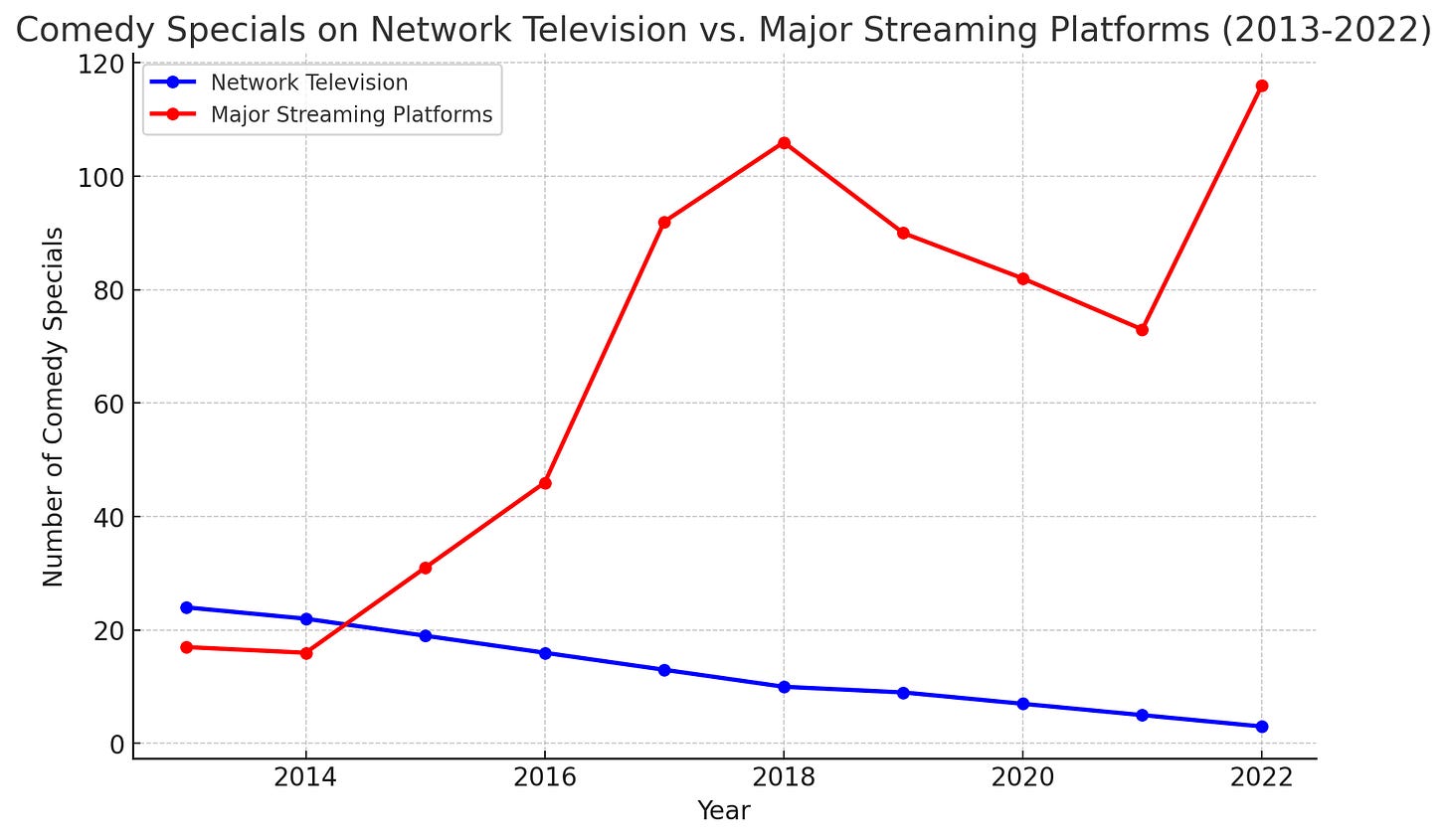
The shift in distribution has rendered comedy more accessible, bringing it closer to the mainstream. And as a result, stand-up comedy has evolved from an underground niche to a major pillar of pop culture, evidenced by the top-line numbers:
Live comedy revenue (per INTIX):
2010: Stand-up shows generated approximately $300 million in gross revenue
2023: Grosses from stand-up shows nearly tripled over the span of a decade to more than $900 million
Comedy events market (per Statista):
2017: The U.S. comedy event market generated approximately $2 billion in revenue
2020: Decline due to the COVID-19 pandemic
2022: Ticket sales rebounded to the tune of an estimated $2.5 billion in revenue
Migrating from network television to streaming, stand-up comedy has, in turn, permeated social media—with YouTube, Instagram, and TikTok serving as distribution channels for stand-up specials, roasts, and viral jokes. Along with the distributional shift has emerged a shift, or broadening, in the threshold for acceptable language use in comedy.
Take comedian Shane Gillis, for example, who many consider to have the best Trump impersonation of all time (see video clip below). After being “canceled” from SNL for off-color jokes made on his Patreon, Shane Gillis rose meteorically as a stand-up comedian. In a full-circle twist—what some might consider a repudiation of cancel culture—he was invited back in February 2024 to host SNL, where he blatantly used several “forbidden” words throughout his eight minute monologue in front of a national primetime audience3:
Gillis on SNL:
“My sister, my niece’s mother, she didn’t know she could get pregnant. She fostered then adopted three black kids. Then she finally got pregnant. Now she has a kid with Down syndrome. Her husband is from Egypt, he’s an Arab guy. You go to the house, it’s like getting into the craziest Uber pool you’ve been in.”
[Laughter]
“It’s crazy. Like, how did you guys meet?”
[Laughter]
“But there’s something, I don’t know– my niece, one day– I’m not saying it’s something I’m looking forward to, but I think it will be a nice thing for the whole country. I would say when my niece is probably in fifth, sixth grade, out at recess, some white kids out there, “hey, you’re not allowed to play with us, you’re
retarded.” Then three black kids come flying out of nowhere. Start whaling on thatcracker.”[Cheers, laughter, and applause]
Objectively, regardless of how offensive the language is, it was a brilliant bit rooted in comedic irony. (And by the way, Shane has publicly used much, much more offensive language before and after his SNL appearance.)
Culturally, the decision to have Shane Gillis host SNL symbolized a turning point—a shift away from the weaponization of outrage, or in other words, the cancelling of cancel culture. This was particularly striking given that SNL has long been captured by progressive left wing ideology. Whereas objectively humorous jokes involving taboo language and topics were often used as an attack vector to ruin people’s careers on the grounds of “hate speech,” and “harmful rhetoric,” Gillis’ SNL moment marked a reversion to the mean—a cultural correction to the left’s overreach in attempting to suppress certain kinds of speech.
A perfect case in point of this is insult comic and emerging provocateur of wokeness, Tony Hinchcliffe. Yes, that Tony Hinchcliffe—the one too busy selling out arenas (like Madison Square Garden) to give a shit about political backlash over a joke that was “bad” only because it didn’t land, not because it was offensive. In what Democrats were hailing as a ‘gotcha’ moment mere days before the election, the only thing their outrage really exposed was how disattuned they’ve become to comedy culture.
Hinchcliffe, on the other hand, has revolutionized the format of comedy events with his live-recorded podcast aptly named Kill Tony. The show’s brutal format is as unique as it is entertaining. Flanked by an improvisational band, Hinchcliffe and a panel of seasoned comics sit on stage as one randomly selected comedian after another performs a one-minute set, followed by Q&A and, more often than not, a roast (barring the rare occasion the selected comic does well and is funny).
If you’ve watched Kill Tony, you’d know just how harmless his Puerto Rico joke was. You’d also understand that he’s a reigning king of comedy right now—and the king does (and says) what the king wants. If ever there were proof that edgy comedy is back in full force, Kill Tony is it. Now touring nationwide, Kill Tony has skyrocketed in popularity, with its YouTube channel growing from 200,000 subscribers at the beginning of 2023 to nearly two million today.
In an episode that aired in early July 2024 with Shane Gillis appearing as Donald Trump, the show went viral, amassing 21 million YouTube views and millions of impressions across all social media platforms.4
(If you skipped the video, don’t, and thank me later.)
Since this episode, Kill Tony’s epic rise in popularity has only accelerated:
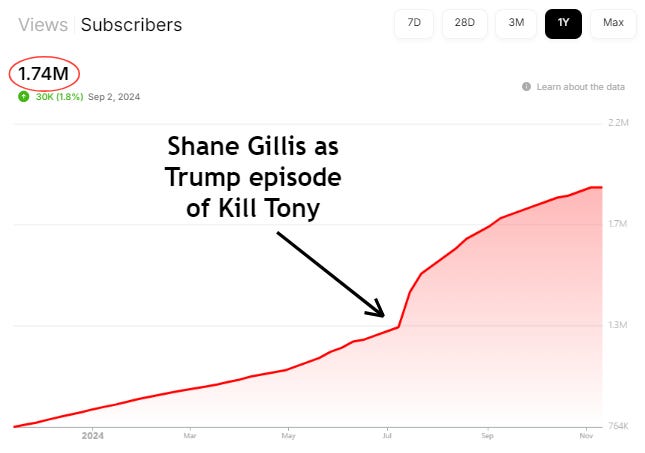
But in my view, the real inflection point came when Hinchcliffe delivered a coronation of the anti-woke movement at The Roast of Tom Brady, which premiered live on Netflix in May 2024. With a barrage of jokes laced with undertones of racism, sexism, homophobia, misogyny, and more—using language that would have been blanketly considered "cancelable" not so long ago—Hinchcliffe provoked reactions across the spectrum, from gasps to murmurs to laughter and eventually, thundering applause. Every punchline landed in his signature, unapologetically offensive style.5
The live audience was a ‘who’s who’ of celebrities, athletes, movie stars, and influencers. I watched the entire special as it premiered live on Netflix, finding it deeply hilarious and raunchily so. As the world reacted—particularly to Hinchcliffe’s use of taboo language and edgy connotations—there was some outrage but not much. Broadly, it was well received which felt surprising, for one, but also like a genuine cultural turning point.
Imagine the reaction to this same language during the COVID era, at the height of peak-wokeness. There would have been calls for cancellation and censorship, social media firestorms, public condemnations, and endless think pieces (granted, there will always be some of this unless the likes of WaPo or The Atlantic go tits up).
But at least some part of society seems to agree with me that fun is indeed back:
is right that modern culture doesn’t trickle down to comedy anymore; comedy is the new arbiter of culture, its raw status quo seeping into the broader zeitgeist, shaping the way people think, laugh, and, yes, even engage in politics.Former New England Patriot wide receiver Julian Edelman even managed to make fun of Aaron Hernandez’s suicide in the middle of a dick joke.
You know what happened. The Washington Post called it “misogynistic” and “cruel.” Gisele Bündchen is said to be “deeply disappointed” by the show—and wanted the world to know that she is currently focused on her charity work.
But guess what? No one cared.
Because the roast—raunchy and crude and totally politically incorrect—was fun.
It felt like a throwback to a simpler time, before Hannah Gadsby made us feel sorta bad about comedy, and SNL fired Shane Gillis for saying a rude word before his first day on the job.
The irony is that Democrats seemed comfortable with offensive content as long as it aligned with their brand of identity politics. But to the average Joe, crude humor from a comic is no more offensive than rapper Cardi B’s “Wet Ass Pussy” or Megan Thee Stallion’s twerking to a round of applause at a Harris rally—both of whom performatively and vehemently endorsed… no, implored voters to pick Kamala Harris at the ballot box. Turns out they, alongside many celebrities in the Hollywood Industrial Complex, were on the wrong side of history.6
So, what does this have to do with the Bro Vote and its impact on the election? Enter another genre of online content that strikes even deeper into the ethos of young American men: the Manosphere.
Keep an eye out for Part 2, which reveals another subculture, the 'Manosphere', how it intersects with comedy culture, the role of podcasting in elections, and why ultimately, ideological arrogance lost Dems the election, not merely the issues of immigration or the economy.I’m of course being facetious, but I mean when you think about it…
Full Shane Gillis SNL stand-up monologue here: Shane Gillis Stand-Up Monologue - SNL
Full YouTube episode here: KT #672 - DONALD TRUMP (SHANE GILLIS) + JOE BIDEN (ADAM RAY)
Full 2h 54m Netflix special here: The Roast of Tom Brady
Reports are revealing the inordinate sums of money they were receiving from the Harris Campaign in exchange for shilling to voters. Who is shocked?




